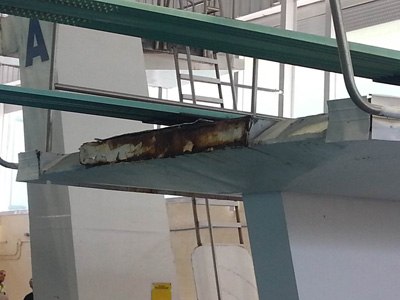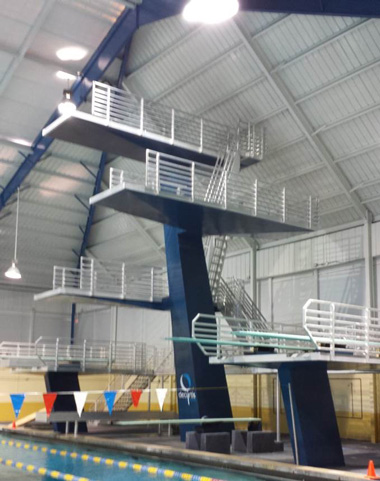The YMCA Aquatic Center in Orlando, Florida houses one of the largest Olympic-size pools in the Southeast and is a favorite training facility for U.S. divers and swimmers looking to compete in Olympic events. The center recently completed the replacement of its old steel 3, 5, 7, and 10-meter diving platforms, as well as the catwalks, stairs, and ladders, with new aluminum structures made by GatorDock. The high strength-to-weight ratio of the aluminum enabled us to design a much stronger platform with improved corrosion resistance.
Originally opened in 1985, the facility was the first of its kind to incorporate lodging and a sporting venue in one location, as well as the first of its kind with retractable roof. “Back then, people thought stainless steel was the best material for diving platforms,” said Joe Linebarier, GatorDock’s regional sales rep. “It rusts at a slower rate than steel, but over time stainless steel still will deteriorate badly.”
Last year, the YMCA noted that the center’s diving platforms and other pool structures were showing signs of deterioration, resulting in an unsafe structure for the swimmers and divers. “The corrosion of the existing steel was not just in the rail, but also the perimeter angles of the platforms,” said Jon Perryman, an engineer at GatorDock.

The renovation of the YMCA Aquatic Center had it’s challenges, with the higher platforms requiring many angled stairways and the need to also repair the concrete at many connecting points. “Each platform had its unique design requirements,” said Perryman. “The 3 meter platforms had to have cutouts at the diving board locations, and an extended rail for safety, while the upper platforms had to have shortened rails so the divers wouldn’t hit the rail with their arms during their pre-dive routine.”
Perryman explains that in early meetings with the YMCA, GatorDock supplied several railing style options, from simple pipe railing similar to the design they previously had to vertical pickets. A horizontal rail style was selected as the best combination of price and aesthetic for this project. “Aesthetics were one of the main considerations in the final design,” explained Perryman. “The customer chose a square tube for structural strength with rounded edges for finger-friendly use, and the mill finish aluminum was chosen not just because of its low maintenance, but also to offset the dark blue color of the refurbished platforms. The catwalk between the platforms is definitely unique to this system and allows a much smoother flow between platforms than separate/individual ladders would have.”
Marine-grade aluminum was chosen for this project, due to its low maintenance requirements and resistance to corrosion. In selecting an allow for the center, GatorDock engineers looked to The Aluminum Design Manual, published by the Aluminum Association, which assigns grades to the various alloys according to strength, corrosion resistance, and ease of fabrication. Perryman explained, “A grade of ‘A’ or ‘B’ means there have been no known instances of failure in service for these alloys. Typically, 6063 and 6061 are two of the most commonly accepted marine-grade alloys; while 6063 has slightly better corrosion resistance, the greater strength of 6061 makes it the preferred alloy for heavy-duty structures requiring good corrosion resistance.”
The entire job was done for just $60,000 and the center is open for its swimmers and divers to safely train for the upcoming the 2016 Summer Olympics in Rio de Janeiro, Brazil.

